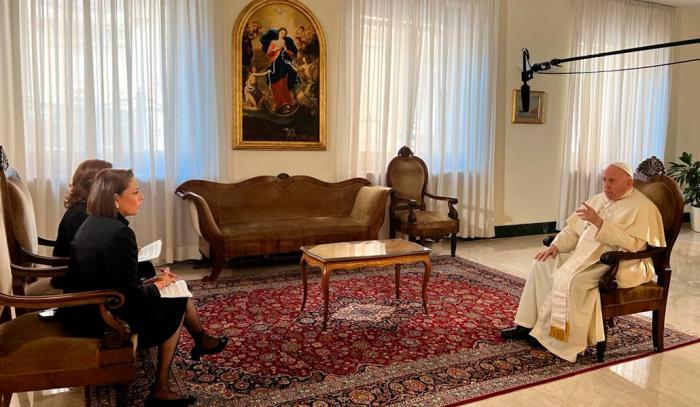|
The words of the Pope, which were warmly received in Cuba as they came from a dearest friend, stirred the hatred and the insults typical of the enemies of the Revolution. I have a human relationship with Raul Castro, said Pope Francis. Photo: Estudio Revolución The enemies of Cuba felt uncomfortable with the answers of Pope Francis during a recent interview with TV network Univision when he said, "Cuba is a symbol, Cuba has a great history". The head of the Catholic Church also stated he rejoiced when an unprecedented process of normalization of the relations between the two countries began on December 17, 2014. With the usual viciousness that characterizes the Cuban extreme rightwing based in the United States and its cronies in several countries, they immediately launched an attack against the Pope. Some of the words uttered by the Pope took them to the paroxysm of rage, such as "I love the Cuban people very much. I had good human relations with Cuban people and also, I confess, I have a human relationship with Raul Castro." The Miami media tried to make believe that the Pope’s statements arouse discontent among the "Cuban people" and the international community. They even accused him, based on their particular opinion on the subject, of betraying the inhabitants of the Island, of "scandalizing" Christians and "disrespecting" the Church. Republican congressmen of Cuban origin said they were "deeply disappointed" by the Pope's failure to condemn the "atrocious abuses of the Castro regime" and to show solidarity with "the Cuban people's demands for freedom," according to the Los Angeles Times. Tamara Taraciuk, acting director of Human Rights Watch for the Americas, criticized the Pope's position on Cuba, and dared to call on him to play "an important role" in human rights issues. This is not the first time that the extreme right has attacked the Pope. The most conservative Catholics have always seen him as a Pope who is "too close to the poor," and some even labeled him a communist, as if being on the side of the vulnerable were not one of the central axes of Christian doctrine. The chorus of furies at the service of the discrediting campaigns against Cuban even went as far as, in their usual display of ignorance, bad taste and lack of ethics, referring to the "danger" that the Holy Father's pronouncement means, from the point of view of his infallibility. In the theology of the Catholic Church, papal infallibility constitutes a dogma declared in 1870 at the First Vatican Council. The Pope is preserved from committing an error when he promulgates to the Church a dogmatic teaching on matters of faith and morals, under the rank of "solemn pontifical definition" or ex cathedra declaration. Since it is considered a truth of faith, no discussion is allowed within the Catholic Church and it must be unconditionally complied with and obeyed. The Holy Father did not make an ex cathedra manifestation in his statement; only a group of haters could think something like that. What he did was to show, as a human being, his love and friendship to the Cubans, a people that welcomed him with immense affection when he visited the island. Pope Francis would say -as John XXIII once did before the students of the Pontifical Greek College- "Ío non sono infallibile, I am only infallible when I define ex cathedra, but I will never do it". The extreme rightwing based in Miami does not "forgive" the him for his meeting with the historic leader of the Revolution Fidel Castro Ruz when he visited Cuba in 2015. They also reproach him that in 1998, when he was Archbishop of Buenos Aires, Argentina, he wrote a book entitled Diálogos entre Juan Pablo II y Fidel Castro (Dialogues between John Paul II and Fidel Castro), in which he advocated a rapprochement with the Government of Cuba. Just as they "do not forgive" his opinions regarding Cuba, conservatives do not tolerate Francis' position in favor of peace, his support for the legalization of civil unions between people of the same sex, his defense of multilateralism and the need for a reform of the United Nations, which he stated unequivocally in his speeches at this organization, as well as in Fratelli tutti. In Cuba, his words were received as those of a friend consistent with his doctrines and faith. AuthorThis article was republished from Granma. Archives July 2022
0 Comments
Leave a Reply. |
Details
Archives
July 2024
Categories
All
|

 RSS Feed
RSS Feed